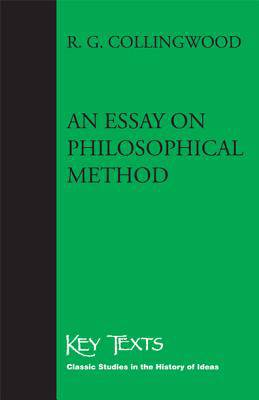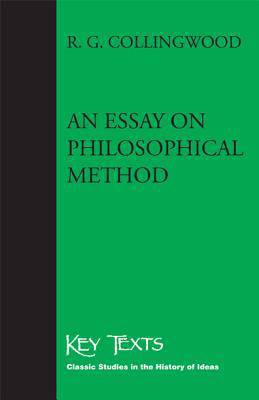
- Retrait gratuit dans votre magasin Club
- 7.000.000 titres dans notre catalogue
- Payer en toute sécurité
- Toujours un magasin près de chez vous
- Retrait gratuit dans votre magasin Club
- 7.000.000 titres dans notre catalogue
- Payer en toute sécurité
- Toujours un magasin près de chez vous
Description
"My best book in matter, in style. I may call it my only book."
An Essay on Philosophical Method contains the most sustained discussion in the twentieth century of the subject matter and method of philosophy and an unparalleled explanation of why philosophy has a distinctive domain of enquiry that differs from that of the sciences of nature.
Collingwood's mature work of metaphysics seeks to overhaul the notion of philosophical method, assigning philosophy the task of "thinking out the idea of an object that shall completely satisfy the demands of reason." The Essay is particularly interesting as an embodiment of the idealistic metaphysics Collingwood abandoned in later life.
This edition (a reprint of the 1933 edition) of the Essay focuses on Collingwood's contribution to metaphilosophy and locates his argument for the autonomy of philosophy against the twentieth-century trend to naturalize its subject matter. Collingwood argues that the distinctions which philosophers make, for example, between the concepts of duty and utility in moral philosophy, or between the concepts of mind and body in the philosophy of mind, are not empirical taxonomies that cut nature at the joints but semantic distinctions to which there may correspond no empirical classes. This identification of philosophical distinctions with semantic distinctions provides the basis for an argument against the naturalization of the subject matter of philosophy for it entails that not all concepts are empirical concepts and not all classifications are empirical classifications. Collingwood's explanation of why philosophy has a distinctive subject matter thus constitutes a clear challenge to the project of radical empiricism.
Spécifications
Parties prenantes
- Auteur(s) :
- Editeur:
Contenu
- Nombre de pages :
- 240
- Langue:
- Anglais
- Collection :
Caractéristiques
- EAN:
- 9781587312281
- Date de parution :
- 29-03-24
- Format:
- Livre broché
- Format numérique:
- Trade paperback (VS)
- Dimensions :
- 140 mm x 216 mm







